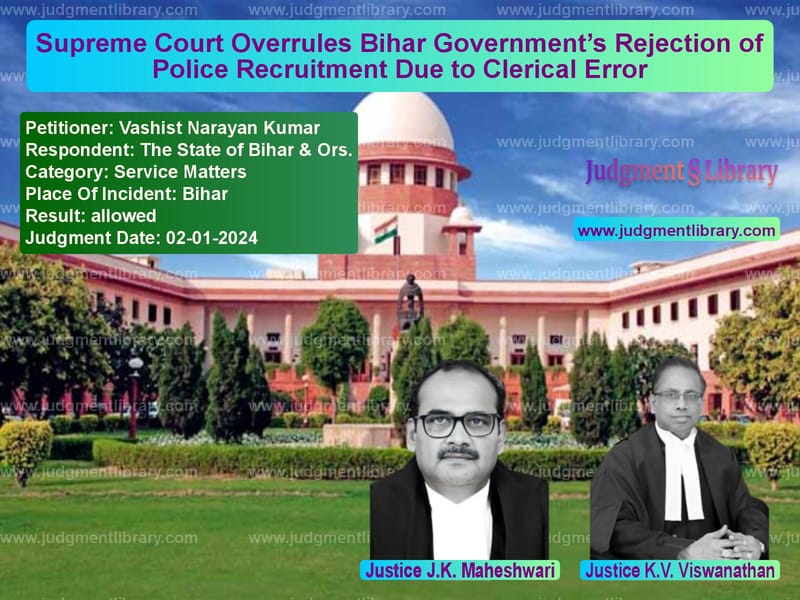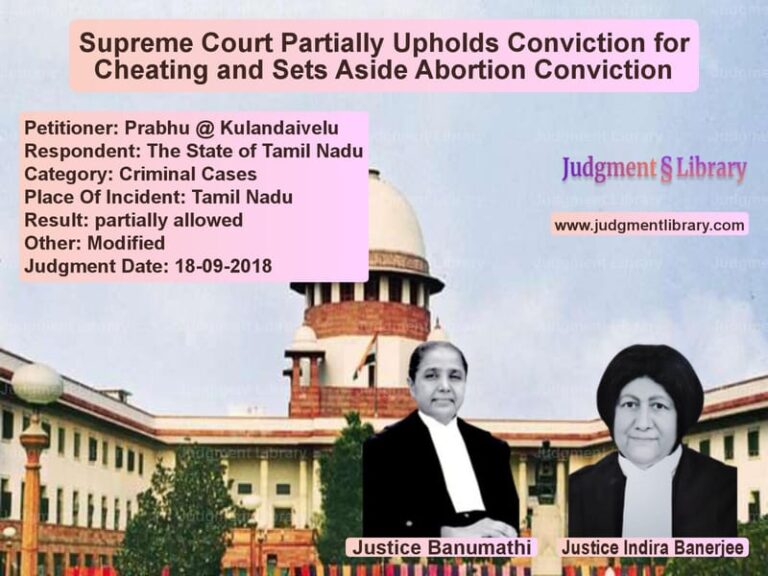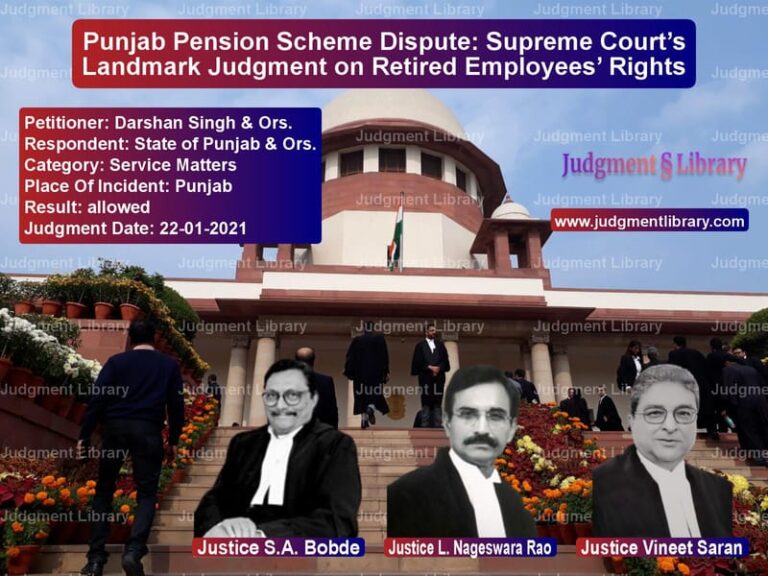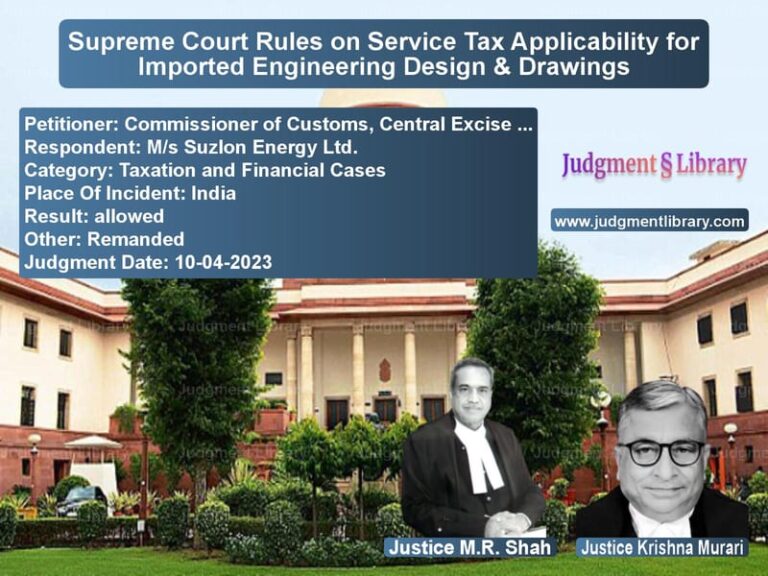Supreme Court Overrules Bihar Government’s Rejection of Police Recruitment Due to Clerical Error
The Supreme Court of India, in a landmark judgment, has ruled in favor of a police constable applicant, Vashist Narayan Kumar, whose candidature was rejected due to an inadvertent clerical error in his online application form. The judgment, delivered on January 2, 2024, reinforces the principle that trivial and unintentional errors should not be grounds for denying legitimate employment opportunities.
Background of the Case
Vashist Narayan Kumar, a resident of Dheodha village in Bihar, had applied for the post of Police Constable under the reserved category as per Advertisement No. 1 of 2017 issued by the Central Selection Board (Constable Recruitment), Patna. The appellant had fulfilled all eligibility criteria, including the educational qualification of 10+2, and successfully cleared both the written examination and the Physical Eligibility Test (PET).
The issue arose when he submitted his documents for verification. It was found that while his actual date of birth, as recorded in his school certificates, was 18.12.1997, his online application mistakenly listed it as 08.12.1997. This discrepancy led to the rejection of his application.
According to the appellant, the mistake occurred due to an inadvertent entry made at a cybercafé where he filled out the online application form with the help of an operator. He derived no benefit from the mistake, as either date would have still kept him within the eligible age bracket. However, the recruitment authorities rejected his application based solely on this clerical error.
Legal Challenge and Arguments Presented
After receiving no response to his representations, the appellant filed a writ petition before the Patna High Court, seeking a directive to the authorities to correct the error and consider him for appointment. The Bihar government, however, strongly opposed his petition, arguing that:
- The recruitment advertisement explicitly required candidates to enter their date of birth accurately as per their 10th board certificate.
- It was clearly mentioned that any discrepancy in document verification would lead to the automatic cancellation of candidature.
- A facility for correcting application errors was provided, which the appellant failed to utilize.
- The rejection was in accordance with the rules laid down in the recruitment process.
The Single Judge of the Patna High Court dismissed the petition, citing the need to uphold the integrity of the recruitment process. The Division Bench upheld this decision, stating that the appellant had not formally challenged the result declaration and that procedural compliance must be strictly maintained.
Supreme Court’s Judgment
Hearing the appeal, a bench comprising Justices J.K. Maheshwari and K.V. Viswanathan took a broader view of the matter, focusing on principles of fairness and proportionality. The Supreme Court emphasized that:
- The appellant did not gain any undue advantage from the clerical error, as he met the eligibility criteria regardless of the date recorded.
- The mistake was clearly inadvertent and not a deliberate misrepresentation.
- The authorities themselves did not initiate any criminal proceedings against the appellant, which indicates that they did not consider the mistake fraudulent.
- The appellant had successfully cleared all stages of the selection process, proving his merit for the position.
The Court ruled that the rejection of the appellant’s candidature was disproportionate to the error committed and that technicalities should not override substantive justice. The judgment cited the legal maxim De minimis non curat lex (the law does not concern itself with trifles), emphasizing that minor errors should not be used to deny a deserving candidate his rightful opportunity.
Read also: https://judgmentlibrary.com/supreme-court-upholds-banks-decision-on-employees-voluntary-retirement/
Important Legal Precedents Considered
The Supreme Court referenced several cases where minor application form errors were deemed insufficient grounds for disqualification:
- In Ajay Kumar Mishra vs. Union of India, it was held that minor discrepancies should not lead to automatic disqualification if they do not impact the selection process.
- In Arkshit Kapoor vs. Union of India, a similar mistake in an application form was rectified as it did not confer any undue advantage on the candidate.
- In K. Sangeetha vs. Tamil Nadu Public Service Commission, the court ruled that minor errors in data entry should not prevent an otherwise qualified candidate from appointment.
Directives Issued by the Supreme Court
The Supreme Court, in its ruling, set aside the Patna High Court’s judgment and directed the Bihar government to:
- Treat the appellant’s application as valid, recognizing his date of birth as 18.12.1997.
- If the appellant is otherwise eligible, issue his appointment letter within four weeks.
- If no vacancies remain, still ensure his appointment by adjusting the vacancy in future recruitment cycles.
The Court also exercised its special powers under Article 142 of the Constitution to ensure complete justice in the matter, thereby preventing the appellant from being unfairly denied employment over a trivial error.
Impact and Significance of the Judgment
This ruling carries significant implications for future government recruitments:
- Ensuring Fairness in Recruitment: The decision underscores that recruitment processes must balance procedural compliance with fairness and substantive justice.
- Clarifying the Scope of Errors: The judgment clarifies that minor and unintentional clerical errors should not be treated as deliberate misrepresentations.
- Guidance for Future Recruitment Policies: Government agencies are now expected to incorporate mechanisms for rectifying genuine errors without penalizing deserving candidates.
- Setting a Precedent: The ruling sets a precedent for similar cases where minor discrepancies in application forms are used as grounds for disqualification.
Conclusion
The Supreme Court’s ruling in favor of Vashist Narayan Kumar marks a significant victory for candidates who may face disqualification due to minor clerical errors. The judgment reiterates that procedural rules should not be applied rigidly when they result in manifest injustice. By directing the Bihar government to ensure the appellant’s appointment, the Court has upheld the principle that fairness must prevail over technicalities.
This decision serves as a critical reminder that recruitment processes should focus on merit and eligibility rather than minor application errors. It is expected to influence future employment disputes and encourage recruitment authorities to adopt more reasonable and candidate-friendly practices.
Petitioner Name: Vashist Narayan Kumar.Respondent Name: The State of Bihar & Ors..Judgment By: Justice J.K. Maheshwari, Justice K.V. Viswanathan.Place Of Incident: Bihar.Judgment Date: 02-01-2024.
Don’t miss out on the full details! Download the complete judgment in PDF format below and gain valuable insights instantly!
Download Judgment: vashist-narayan-kuma-vs-the-state-of-bihar-&-supreme-court-of-india-judgment-dated-02-01-2024.pdf
Directly Download Judgment: Directly download this Judgment
See all petitions in Recruitment Policies
See all petitions in Public Sector Employees
See all petitions in Employment Disputes
See all petitions in Judgment by J.K. Maheshwari
See all petitions in Judgment by K.V. Viswanathan
See all petitions in allowed
See all petitions in supreme court of India judgments January 2024
See all petitions in 2024 judgments
See all posts in Service Matters Category
See all allowed petitions in Service Matters Category
See all Dismissed petitions in Service Matters Category
See all partially allowed petitions in Service Matters Category







